Yokohama Rubber's Social Contribution Activities
Under the slogan of "Caring for the Future," the Yokohama Rubber Group is engaged in various activities to create shared value with society through addressing social needs and issues around the world.
- CSV: Creating shared value
Yokohama Magokoro Fund
The "Yokohama Magokoro Fund", which was established by a group of employees in 2016, collects reserve funds from employees who support and voluntarily join the fund (they can start contribution from 100 yen per month). The collected money will be donated to assist social working organizations or to help with disaster relief efforts. The Magokoro Fund system is unique in that the fund collects the same amount of money from the company for each amount contributed by the fund members. This system is called a "matching gift" scheme.
As of the end of December, 2022, around 44% of all the Yokohama Rubber employees are registered members of the fund.
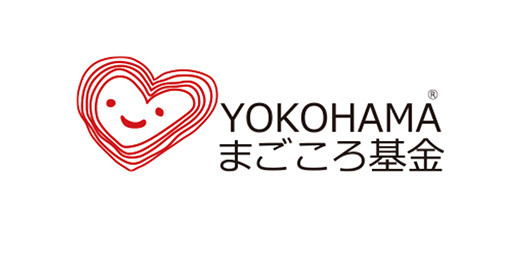
Organizations and initiatives that the Yokohama Magokoro Fund has supported
Specified nonprofit corporation "Japan Hair Donation & Charity"
<Magokoro fund support provided in 2022 and 2023>
Japan Hair Donation & Charity donates wig hair to support children aged 18 or younger who have hair problems for some reasons, such as loss of hair or thinning due to disease, cancer treatment or external injury.

Approved specified nonprofit corporation "Florence"
<Magokoro fund support provided in 2022 and 2023>
Florence operates under a mission to create a society "where diverse types of families can all live happily, where children are loved and taken care by everybody and can be given a chance to try anything they want to." Florence provide various forms of childcare and family support to people in need, for example taking care of children who are sick or disabled so that their parents can go to work, running small-scale childcare services, providing child adoption support and offering midwife services free of charge, in an effort to improve family-related social issues.
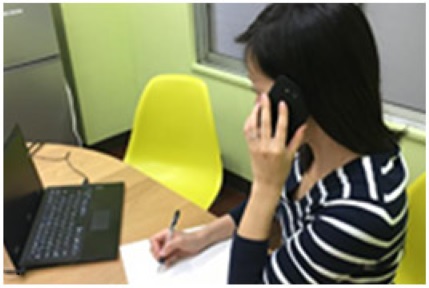
Specified nonprofit corporation "Disaster Rescue Dog Network"
<Magokoro fund support provided in 2022>
The Disaster Rescue Dog Network has a network to quickly dispatch disaster rescue dogs to disaster-hit areas. They also train candidate dogs to acquire human search and rescue skills to help save lives.
Specified nonprofit corporation "Ikaw・Ako"
<Magokoro fund support provided in 2022>
Ikaw Ako aims to strengthen the friendship between Japan and the Philippines, and supports various activities including conducting deforestation surveys in the Philippines and hosting reforestation efforts together with local residents.
Approved specified nonprofit corporation "Child Fund Japan"
<Magokoro fund support provided in 2022 and 2023>
Child Fund Japan supports children living in poverty in Asian countries so that they can live and grow healthfully. The Fund also assists their families and communities to become self-reliant.
To this end, Child Fund Japan runs a sponsorship program to where the supporters can exchange letters with the supported children to watch over their development and well-being.
General incorporated association "JEAN"
<Magokoro fund support provided in 2022 and 2023>
JEAN runs a nationwide cleaning initiative including seashore litter surveys as well as lectures and study sessions to educate people about marine litter hazards.
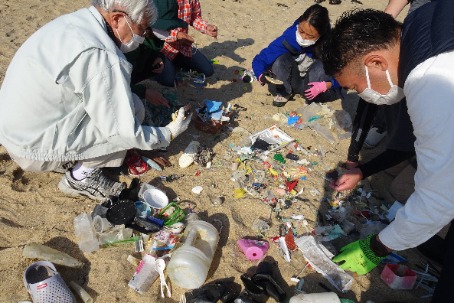
Public interest incorporated association "Chance for Children"
Aiming to eliminate educational disparities among children due to economic disparities of their families and to break the cycle of poverty across multiple family generations, Change for Children supports children with economic difficulties by providing study coupons that can be used for evening tutoring classes and various learning and experience programs.
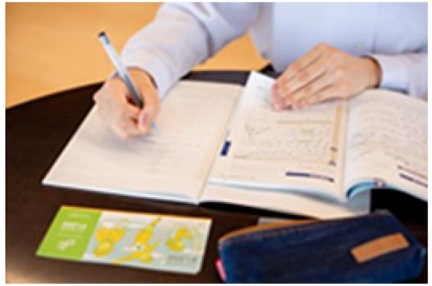
Specified nonprofit corporation "Borneo Rainforest Restoration Project"
<Magokoro fund support provided in 2022>
With the aim of protecting the tropical rainforests in northwestern part of the Borneo Island in Malaysia from excessive development and restoring lost forests, Borneo Rainforest Restoration Project continues tree planting and growing activities with understanding and support from the local Forestry Department and also from the indigenous people living in the area.
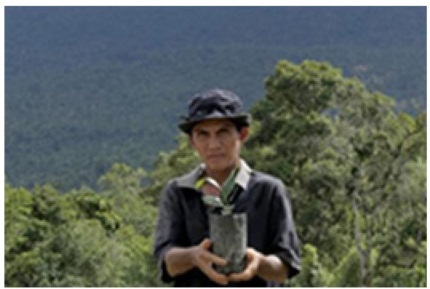
Social welfare corporation "Kanagawa Rehabilitation Center"
(= alternatively called "Kanagawa Myoelectric Prosthetic Hand Bank") <Magokoro fund support provided in 2022 and 2023>
To support children who are without arms congenitally or lost arms from illness or in an accident so that they can live a happy and fulfilling life, Kanagawa Rehabilitation Center promotes the use of myoelectric prosthetic hands by providing user training and also renting them out to prospective users.
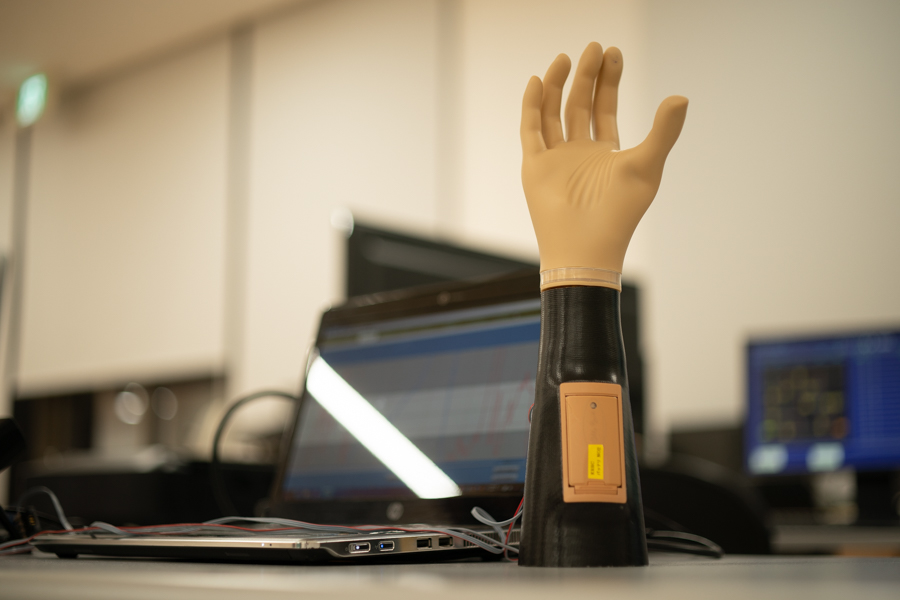
Local incorporated administrative agency "Kanagawa Children’s Medical Center, Agency, Kanagawa Prefectural Hospital Organization" <Magokoro fund support provided in 2022 and 2023>
Aiming to improve pediatric medical care, Kanagawa Children’s Medical Center runs "Kanagawa Prefectural Hospital Pediatric Healthcare Fund" and subsidizes pediatric healthcare studies, assists medical institutions to purchase pediatric equipment and supplies, and supports programs aimed at the improvement of the living condition of the patients and their families under medical care.
Public interest incorporated association "Japanese Association for the Promotion of Hearing Dogs"
<Magokoro fund support provided in 2023>
With the aim of creating a society where hearing-impaired people can live happily and safely and where people can live in harmony with animals, the Japanese Association for the Promotion of Hearing Dogs runs projects to promote the wider use of hearing dogs and raise public awareness about their usefulness, procure and train candidate puppies into fully functioning hearing dogs, and train and certify human hearing-dog trainers.
Approved specified nonprofit corporation "Kamonohashi Project"
<Magokoro fund support provided in 2023>
Kamonohashi Project was established in 2002 with the aim of eliminating child trafficking so that all the children in the world can live with hope for their future. Kamonohashi Project first started activity in Cambodia and is currently operating in India to support survivors (trafficking victims) and to help create a social system that prevents human trafficking in the country. In Japan, Kamonohashi Project is working to prevent child abuse and to help young people who have grown up in childcare facilities to be able to live independently.
Specified nonprofit corporation "Good Neighbors Japan"
<Magokoro fund support provided in 2023>
Good Neighbors Japan is an alliance member of "Good Neighbors International," an international organization established in 1991 for humanitarian and development assistance for people around the world, and it provides support related to education, water supply and medical services in Asia and Africa. Good Neighbors Japan also promotes "Good Gohan," a food bank project in Japan to provide food aid to single-parent households as an effort to combat child poverty in the country.
Approved specified nonprofit corporation "Rebit"
<Magokoro fund support provided in 2023>
Toward realizing a society where all the children including LGBT kids can be allowed to be their true selves while they live and grow into adulthood, Rebit provides lectures, training programs and original educational materials to schools, businesses and local governments to foster better understanding of LGBT people as well as works on activities to provide career support to people who are "different" in various ways.
Disaster relief support cases provided by Yokohama Magokoro Fund
The Yokohama Magokoro Fund also provides financial supports to disaster relief efforts.
Records of disaster relief and humanitarian assistances provided by the fund
March 2022: Donation to areas affected by the Fukushima Earthquake
March 2022: Humanitarian aid for Ukraine
September 2022: Donation to areas affected by Typhoon Talas
February 2023: Donations to areas affected by Turkey–Syria earthquakes
July 2023: Donation to areas affected by Typhoon Mawar and related rainstorms
July 2023: Disaster caused by a series of rainstorms from July 7, 2023
September 2023: Donation to areas affected by the wildfires in Hawaii, U.S.
The Laojunshan Ecosystem Preservation Project
Laojunshan, located in Yunnan Province, China, is a mountainous area surrounded by rich nature registered as a World Natural Heritage site in 2003. However, as people living there had no means to earn income other than cutting down and selling trees, a serious environment destruction has been underway in this area. The Laojunshan Project is a unique project to protect the ecosystem of the Laojunshan area by transforming the local economic base from destructive forestry to agricultural and livestock production.
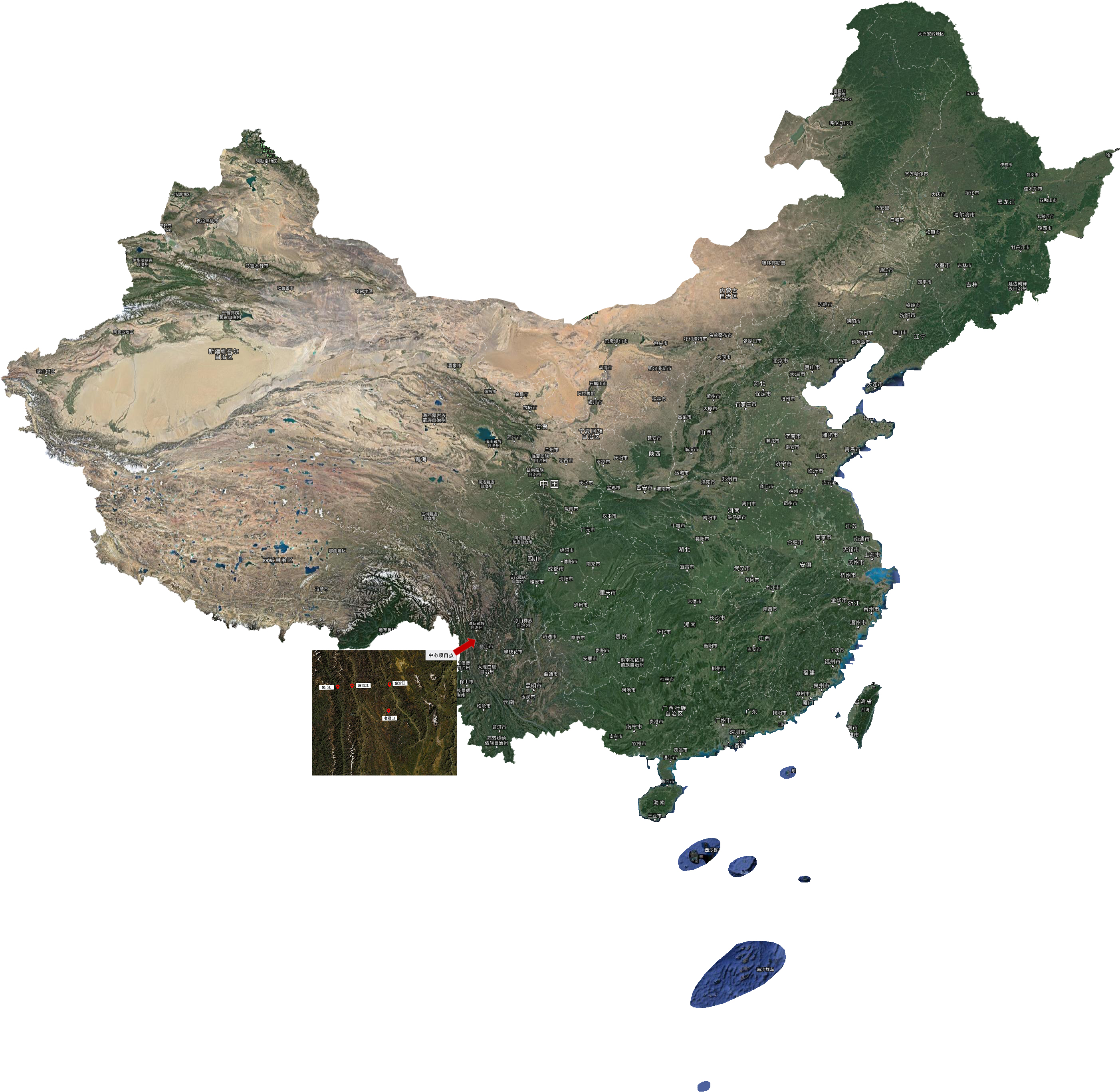
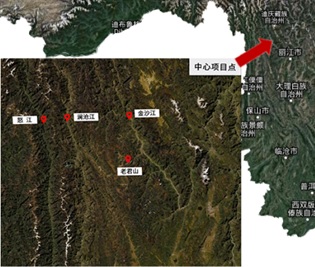
In 2011, Yokohama Rubber (China) Co., Ltd. (Y-CH), our Chinese headquarters, started the Laojunshan project in Hengyuan Village. Y-CH operates a "Village Bank" to provide loans for people to make a transition from non-sustainable forestry to agricultural and livestock production, and the "Natural Ecological Industry Cooperative Association" to provide training as well as the "Platform to Sell Eco-Friendly Agricultural and Forestry Products" for the selling of agricultural and livestock products, providing financial support for the education of children. The project was later expanded to cover the neighboring Liuguang and Liming Villages and then to the adjacent Guangxi Province as well.
Due to those activities and a highest potential for environmental protection success, the Laojunshan Ecosystem Preservation Project was recognized by the State Council of China as a subject of the national population census in 2017.
Another area of Y-CH's humanitarian effort is the preservation of the traditional culture of the Lisu people, an ethnic minority living in Laojun Mountain. Y-CH provides tools to the Lisu people to help make their traditional textiles and musical instruments, and held workshops presented by folklorists to preserve their traditional handcraft skills. In 2019, they donated traditional Lisu musical instruments to an elementary school in Liming Village. In the same year, the Y-CH Laojunshan project became an official part of the "World Code of Conduct for Indigenous and Community Conserved Areas (ICCA)" in the Global United Nations Environment Program (UNEP).
In 2023, Y-CH shifted the focus of the Laojunshan project to the eco-industrial support for the local beekeeping practice, by supporting bee farms and planting and growing honey-bearing plants to promote honey selling business by the local bee farmers. Through these activities over the past 12 years, Y-CH has successfully protected approximately 200 million square meters of forests and a 12km-strong drainage system.
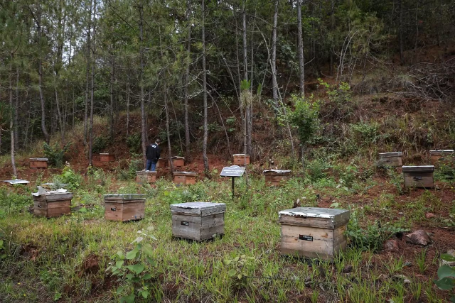
Donated bee farm
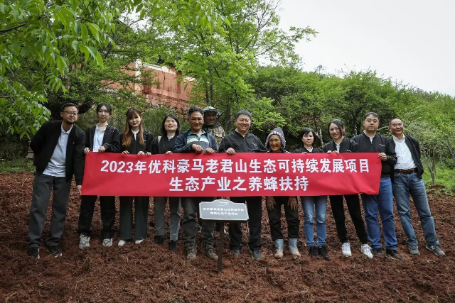
Group photo of 2023 activities
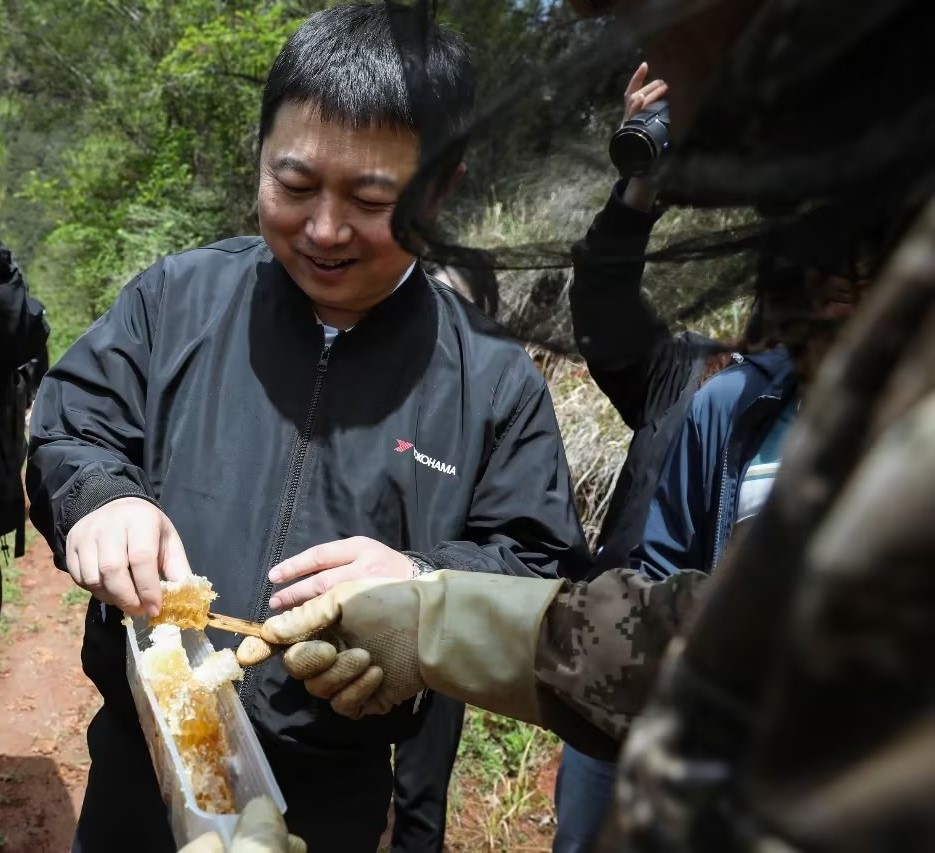
honey harvesting work
Related Links
News | Yokohama Rubber Donates Ethnic Musical Instruments to Local Elementary School for the Preservation of Chinese Folk Culture
Yokohama Rubber (China) Co., Ltd. (Y-CH) (Chinese headquarters) | The Yokohama Rubber Co., Ltd.
Activities by other Yokohama Rubber subsidiaries
Promotion of Business with Minority-Owned Companies
Yokohama Industries Americas Inc. (YIA) in U.S.
YIA, which manufactures and sells automotive air conditioners, power steering systems, and other products in the United States, actively promotes business with minority-owned firms in order to support social minority groups (minorities) such as African and Hispanic Americans. YIA's business is growing steadily along with the dramatic growth of minority-owned firms they support over the recent years.
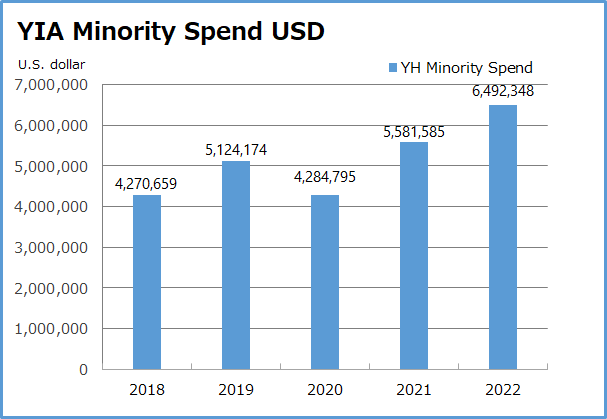
Related Links
Localization Project to promote local use of the locally produced natural rubber (Yokohama Tire Philippines, Inc. (YTPI) in the Philippines)
In 2014, YTPI, which produces tires for passenger and recreational vehicles in the Philippines, started an initiative called "Localization Project" to help revitalize the Philippine economy by locally procuring the rubber material for their vehicle tire production.
Now the project has expanded dramatically, and YTPI's consumption of natural rubber from the Philippines is continuously increasing. Before the start of the project, imported natural rubber accounted for 79% of the YTPI tires with locally produced natural rubber only 21%. With their continuous efforts since the project began, the use of Filipino-made natural rubber has increased year by year, accounting for 54% of the entire production as of 2022.
YTPI's Localization Project has greatly benefited the Filipino people engaged in agriculture and trade, and is expected to continue to play an even larger role in securing a stable income source for them.
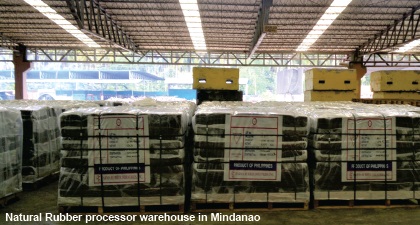
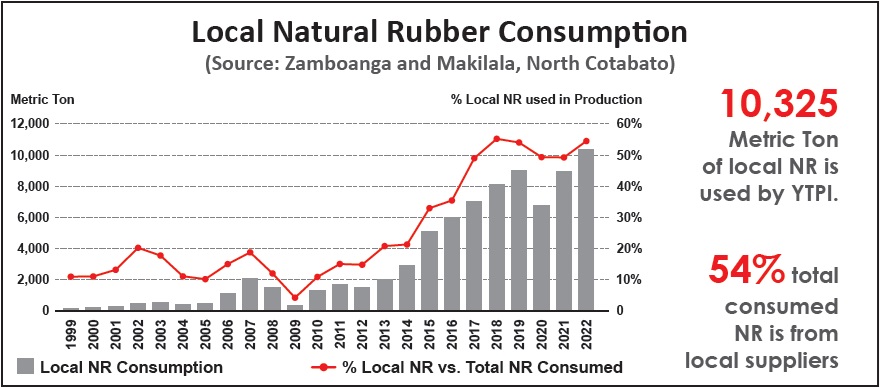
YTPI also actively promotes localization in various areas other than the procurement of raw materials, such as the local procurement of equipment maintenance and mold repair services. In selecting suppliers, YTPI conducts checks on their compliance and service quality.
Promoting agroforestry farming (Y.T. Rubber Co., Ltd. (YTRC) in Thailand)
YTRC, a natural rubber processing company in Thailand, is promoting agroforestry practice among small-scale farmers (smallholders) who grow natural rubber (para rubber trees) in the farms in areas around the factory in the Surat Thani Province in southern Thailand.
Agroforestry farming is a form of mixed cultivation that enables smallholders to harvest agricultural products other than rubber tree sap and secure a more stable source income by growing other crops beside para rubber trees. By promoting agroforestry farming, YTRC is working to maintain a good balance between financial and living stability of the smallholders versus biodiversity and forest preservation.
Furthermore, we are cooperating with agroforestry farming experts at universities to supply saplings to an experimental farm run by YTRC. YTRC also provides more than 10,000 saplings that they have grown from seeds to local schools, institutions, and individuals that want to grow them every year. This activity has earned good appreciation in the local communities.
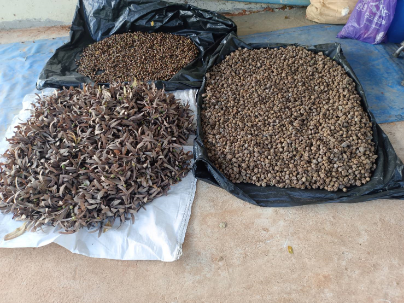
Collected seeds
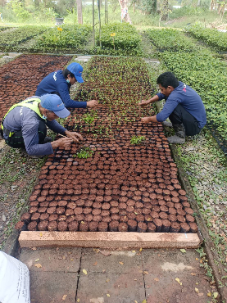
Preparing seeds for seedling pods
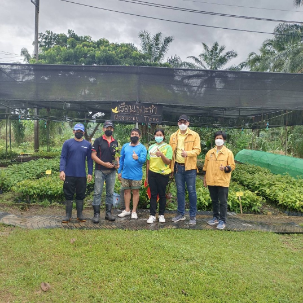
Donation of seedlings grown at YTRC
In order to provide continuous support to the smallholder rubber farmers, YTRC has been holding regular seminar events to improve the quality of natural rubber in collaboration with the Rubber Authority of Thailand (RAOT), which is under the jurisdiction of the Ministry of Agriculture and Cooperatives of Thailand.
In January 2020, Yokohama Rubber signed a Memorandum of Understanding (MOU) to cooperate with RAOT to support the management of natural rubber farmer and ensure supply chain transparency and soundness. The above-mentioned seminar events are organized as part of our farmer support under this MOU.
The fifth seminar event in June 2023 was attended by 50 farms from the Surat Thani province with COVID-19 control measures in place, and 250kg of fertilizer utilizing RAOT's knowledge was provided free of charge to each attending farm, which was well appreciated by the attendees.
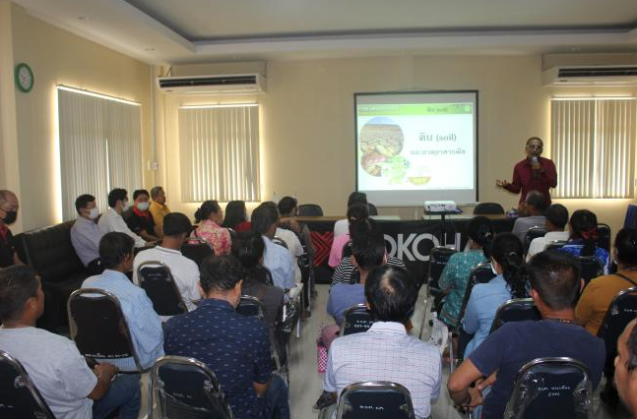
Natural rubber seminar
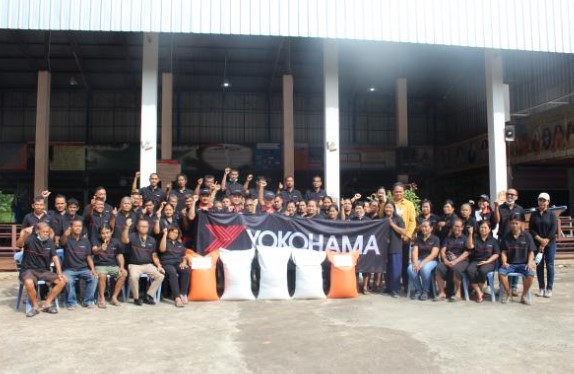
Farmers taking a commemorative photo in front of the provided fertilizers
Related Links
Promoting Agroforestry
Yokohama Rubber and RAOT hold their fifth joint seminar event in support of natural rubber farmers in Thailand
Heisei no Mori" Project (in Otsuchi Town, Kamihei County, Iwate Prefecture)
In 2007, Yokohama Rubber launched the "YOKOHAMA Forever Forest" program to plant trees at all of its production sites in Japan and overseas in preparation for its 100th anniversary in 2017. The "Yokohama Forever Forest" program is an initiative planned and implemented under the guidance of the late Akira Miyawaki, a world-renowned plant ecologist and Professor Emeritus at Yokohama National University (official position at that time of the program), who has organized tree planting projects at more than 1,700 locations in Japan and overseas. At each location of our Forever Forest Program, we plant local native tree species that have been growing in the region for centuries and are best suited to be planted in the area. By doing so, we aim at creating groves of trees that will last and thrive for another 1,000 or 2,000 years in that place. We have originally set a goal of planting, without disturbing the existing vegetation of the place, 500,000 saplings at our production and sales sites in Japan and overseas by 2017, where the company celebrated its 100th anniversary. Under the Program, our group employees and local residents continuously worked side by side to plant trees at and around 14 of Yokohama Rubber sites in Japan and 21 sites in eight other countries. In September 2017, we reached the originally planned target of planting 500,000 saplings, but the program is still being continued toward a new goal of planting or giving away a cumulative total of 1.3 million saplings by 2030.
After the Great East Japan Earthquake in 2011, Mr. Miyawaki conducted a series of field surveys in the affected areas and proposed the creation of a "Forest Seawall to Protect Lives" stretching over a distance of 300 kilometers along the Pacific coast of the Tohoku region. Traditionally in Japanese seacoast areas, Japanese black or red pines have been used to create tide protection groves along the seashore as these tree species are resistant to salty wind from sea and grow quickly even in nutrient-poor soil. However, recent findings indicate that these pine trees can be easily uprooted when subjected to massive tsunami waves since their roots do not have a very strong soil gripping capability. Once uprooted from the ground and made adrift, the drifting pine trunks and branches can become a safety hazard that injures people and damage buildings. Mr. Miyawaki studied the trees and groves in the tsunami-stricken areas that stood near the seashore and survived the tsunami attacks to find that they had formed multi-layered plant communities consisting mainly of evergreen broad-leaved trees. Based on these findings, he proposed to local governments in the affected areas to build seawall structures with these types of trees to save lives should a similar disaster strike again. A number of local governments responded positively to his proposals.
Yokohama Rubber, having become an enthusiastic supporter of Mr. Miyawaki's vision for "Forest Seawall to Protect Lives" and wishing to make good use of its forestation knowledge and skills obtained through its Forever Forest Program to help drive the vision forward, built a tree-planting mound in Otsuchi Town, Kamihei District, Iwate Prefecture in 2012, using earthquake debris including woody debris, earth and sand, and soil-based noncombustible debris such as concrete fragments, There we organized a public tree planting event as a model case of building tree-covered tide protection structures. Such use of earthquake debris has a number of potential benefits: Firstly, it will help reduce debris disposal cost for the municipalities and will also curb CO2 emission by reducing the amount of debris incinerated. Secondly, having a mixture of various debris in the soil will accelerate the sapling growth and will also help them grip the soil more strongly. Lastly, using debris from the earthquake in the tide protection structure will help keep a keen disaster awareness among the residents. In the following year, this planting area was newly named "Heisei no Mori, and employees of Yokohama Rubber have helped the project in various ways including collecting tree seed nuts and growing them into saplings for more planting and holding a tree planting event jointly with local residents every spring.
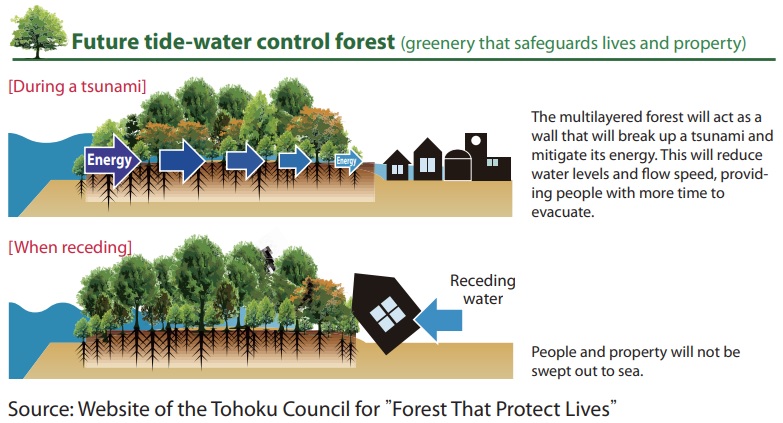
From 2014 on, along with the annual tree-planting event in spring, Yokohama Rubber employees has been giving tree-planting training sessions to students of Otsuchi Gakuen School (run by Otsuchi Town) as part of their Hometown Study Class, which is an education program connected to post-earthquake reconstruction. In the training sessions and along with providing tree-planting experience, we communicate to the children the importance of having disaster awareness, knowing about and contributing to global warming slowdown and the significance of biodiversity preservation efforts. This is an example of the wide scope of involvement we have had in the Heisei no Mori project beyond just planting trees.
Although there have been interruptions during the COVID-19 pandemic, a total of nine tree-planting events have been held to date, and over the course of 10 years, approximately 25,000 saplings (6,000 as part of the Hometown Study Class activities) were planted on the mound, which is a raised structure 5 m high, 15 m wide and 300 m long. The Heisei no Mori project was completed in April 2022. Even after project completion, Yokohama Rubber plans to be involved in mound maintenance tasks such as weeding the mound together with local volunteers as part of environmental improvement efforts.
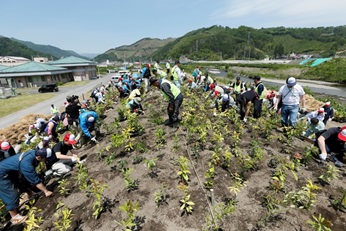
Purpose of the "Heisei no Mori" Project
- To create a "Forest Seawall" to help protect residents from future Tsunami attacks. The tsunami caused by the Great East Japan Earthquake blasted past or destroyed many breakwater structures and seashore tree groves that should have protected the communities from tsunami damages but did not. A seawall of trees created by planting native tree species in a way that maximizes their natural vegetation characteristics, trees that will grow dense foliage and branches (they have wind/sand-preventing functions) as well as strong roots deep into the ground, are hoped to provide a better protection against tsunamis.
- To help raise disaster awareness of the local residents by providing tree planting experience on the specially prepared mound created with earthquake debris
- To revitalize communication across the local community by holding a public event where a large number of residents can get together
- To help educate of schoolchildren and students in the local community by providing tree planting classes as part of their Hometown Study program
- To contribute to global warming mitigation by planting more trees that absorb and fix CO2
- To help preserve biodiversity by planting a variety of tree species in a way that maximizes their natural vegetation characteristics


